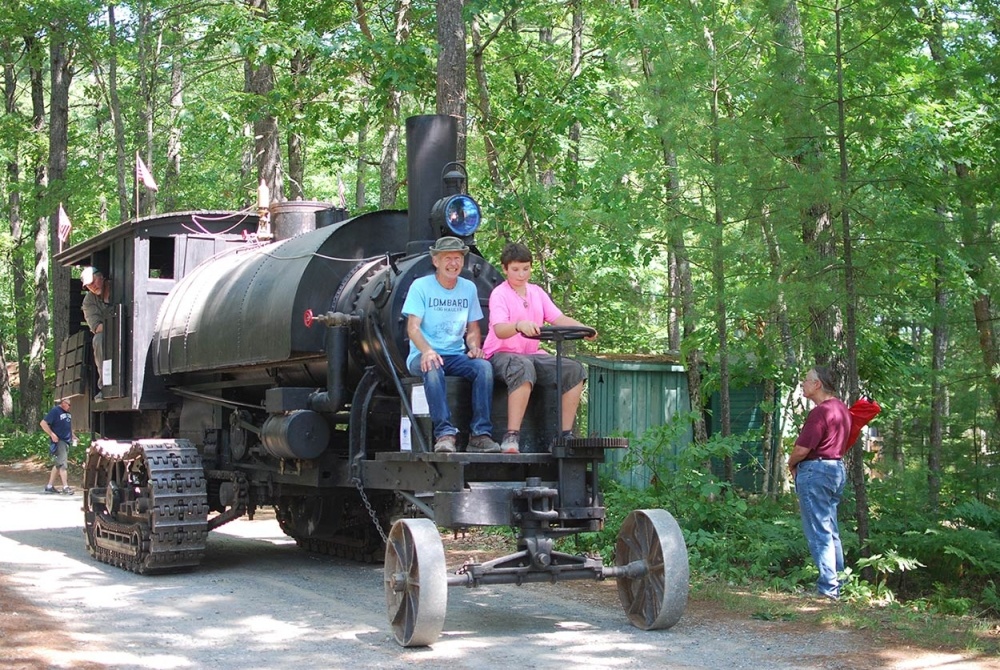This profile of Tory Porter by Jack Beaudoin, complements Beaudoin’s feature article, Lessons in Wood, in the Winter 2023 issue of Northern Woodlands magazine. The article describes the Mechanized Logging Operations and Forest Trucking program (MLOFT), an innovative program that offers training and other support for young adults interested in entering the logging profession. Difficulties recruiting and maintaining skilled workers is a continuing challenge in the forest industry, with potential impacts on regional wood production, as well as forest stewardship activities. Northern Woodlands is grateful for the Maine Timberlands Charitable Trust’s support of this article.
There is a 2016 photo of a young Tory Porter sitting at the business end of a 110-year-old Lombard steam engine that once hauled logs out of the deep woods and down to the river. Sitting next to a grinning Herb Crosby, past president of Maine Forest and Logging Museum at Leonard’s Mills, Porter grips the primitive steering wheel in both hands and peers intently at the dirt road he’s navigating.
“Yeah, I remember that photo,” Porter says with a laugh when the scene is described to him. “I think back to the days when I rode my bike all over those grounds. I was around these older guys who were working to preserve logging history, completely oblivious to the fact that it would someday engulf my life.”
Although Porter insists he’s “nothing special,” his name surfaced on four separate occasions when I was asking around for an alumnus of the Mechanized Logging Operations Program to interview. “The real deal,” a former teacher said. “The perfect example,” another insisted.
“An odd duck,” is how Porter describes himself. “A different breed. I love getting up at 3:00 a.m. and putting in a 12-hour day. At the program, I worked every day for 12 hours that Donald Burr would let me...I still look back at it as one of the best times of my life.”
Porter started the Mechanized Logging Operations Program just two weeks after earning his high school diploma. Apart from some time on an excavator, Porter said he came with no experience.
Three months later, he had a job that paid him more than he’d hoped for and high adventure to boot. “I went way up north,” he said of that first job. “I’d drive to Fort Kent Monday morning, meet at the shop with the other operators, and I wouldn’t see pavement again until Friday night.”
The machines ran 24 hours a day, 5 days a week. He compared camp life to the military – hard work, camaraderie, long days, and no place to spend your pay.
For Porter, that was almost heaven.
He credits his rapid success to Burr’s instruction and the program’s emphasis on safety, professionalism, and doing the job right.
“A good buddy on a job site started running a skidder. He was the spitting image of me – talked alike, thought alike. But he never quite got it,” Porter says. “Without the training I’d been given, it just wasn’t the same with him. It cost my boss a lot to train him, and by that time I already had seat time in a delimber.”
Today Porter – recently married to his high school sweetheart – has taken a job running a Komatsu processor for Prentiss & Carlisle in Bangor. But don’t think for a minute he’s settling down.
“I really want to become an owner-operator someday,” he says. “I want everything: bunchers, tree-length trucks, cranes, processors, delimbers. I’ve got big dreams.”
He stops to catch a breath and then chuckles again. “You know, I still can’t look at a tree without figuring out how I’d cut it.”


